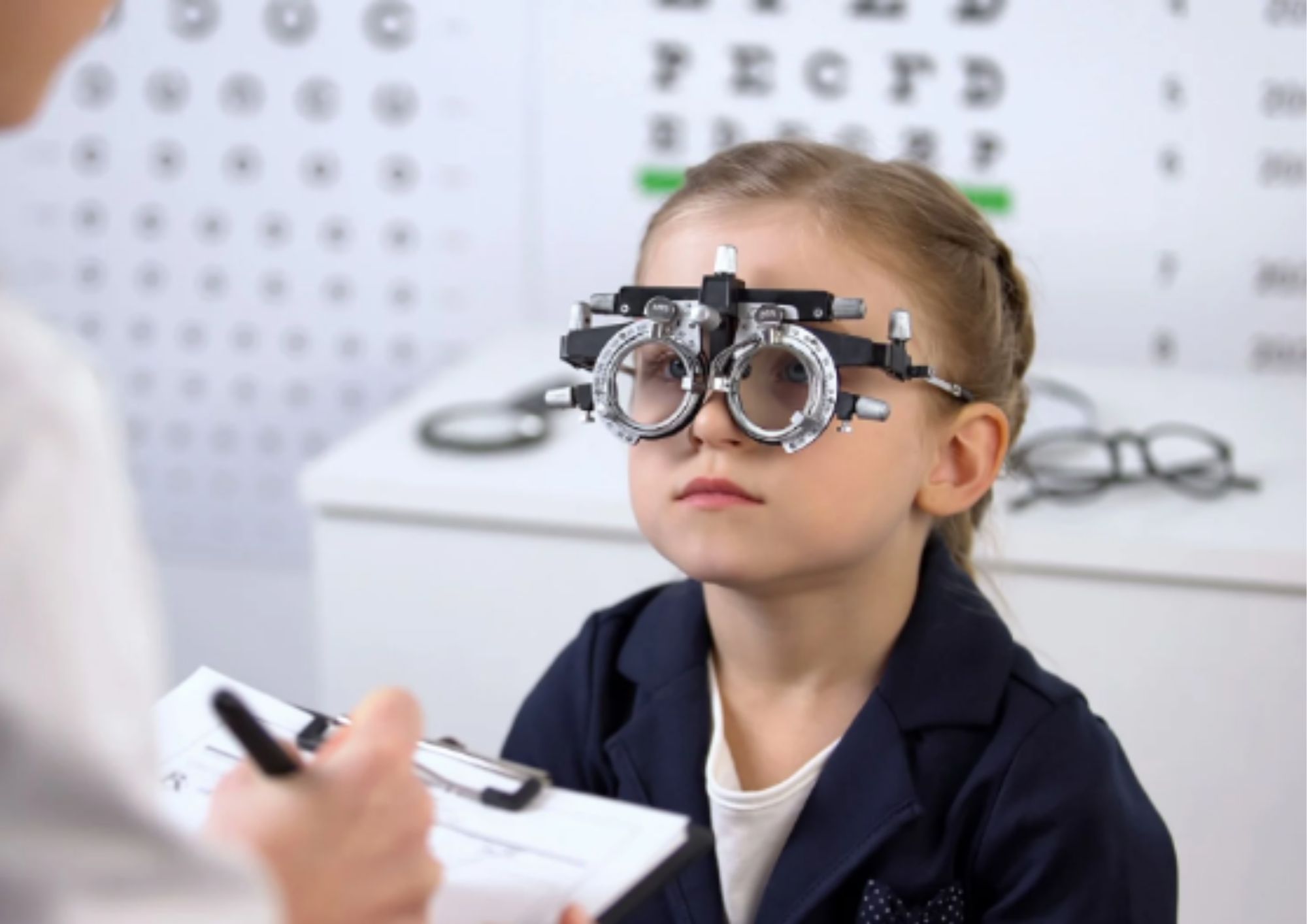If you or your child have been struggling with nearsightedness, this blog post is here to guide you towards effective management and prevention strategies. Myopia, also known as nearsightedness, has become increasingly prevalent in recent years. But fear not!
With the right approach and expert guidance from Dr. Shalini Jain’s team at Samyak Eye Care Clinic, you can take proactive steps to safeguard your vision and maintain healthy eyesight for a lifetime.
So let’s dive into the world of myopia control solutions and empower ourselves with knowledge and practical tips that will make a meaningful difference in our eye health journey!
Understanding Myopia: Causes and Prevalence
Myopia, or nearsightedness, is a common vision condition that affects millions of people worldwide. It occurs when the eye’s focusing power is too strong, causing distant objects to appear blurry. While genetics play a significant role in myopia development, environmental factors also contribute to its prevalence.
- One major factor contributing to the rise of myopia is increased screen time and close-up work such as reading or using digital devices for extended periods. The strain placed on our eyes from prolonged near work can lead to elongation of the eyeball, resulting in myopia.
- Another potential cause is lack of outdoor activities and exposure to natural sunlight. Spending time outdoors has been found to have a protective effect against myopia progression, possibly due to increased levels of natural light and reduced near work during outdoor activities.
- The prevalence of myopia has been steadily increasing over the years, particularly among children and young adults. In fact, it has reached epidemic proportions in some parts of the world. This alarming trend has sparked greater awareness about the need for effective myopia control solutions.
By understanding the causes and prevalence of myopia, we can take proactive steps towards managing this vision condition effectively. With advancements in optometry and technologies like contact lenses for myopia management available at Samyak Eye Care Clinic under Dr. Shalini Jain’s expertise, there are now more options than ever before for individuals looking to address their nearsightedness and protect their long-term eye health.
Why is Myopia Control Important?
Myopia, also known as nearsightedness, has become increasingly prevalent in recent years. It is a condition where objects up close appear clear, but distant objects become blurred. The causes of myopia are multifactorial and can include genetics, environmental factors such as excessive screen time or lack of outdoor activities, and prolonged near work.
So why is myopia control important? Well, left unmanaged, myopia can progress rapidly during childhood and adolescence. This progression not only leads to the need for stronger prescriptions but also increases the risk of developing sight-threatening conditions like retinal detachment, glaucoma, and macular degeneration later in life.
Traditional methods of correcting myopia with glasses or contact lenses simply provide temporary clarity while doing nothing to slow down its progression. That’s where myopia control solutions come into play. These innovative treatments aim to not only correct vision but also slow down the worsening of myopia over time.
One popular option for myopia management is specially designed contact lenses that help reshape the cornea overnight. These lenses gently apply pressure on specific parts of the eye to alter its shape gradually. Another effective solution is atropine eye drops which reduce eye focusing fatigue and inhibit the enlargement of the eyeball.
Traditional Methods vs. Myopia Control Solutions
When it comes to managing myopia, there are traditional methods that have been used for years, as well as newer myopia control solutions that offer promising results. Let’s take a closer look at the differences between these two approaches.
Traditional methods of managing myopia mainly involve wearing corrective glasses or contact lenses. While they do provide clear vision, they don’t address the underlying progression of myopia. These methods simply correct the refractive error but do not slow down or stop its advancement.
On the other hand, myopia control solutions focus on slowing down the progression of myopia in children and adults alike. These solutions can include specialized contact lenses such as orthokeratology lenses or multifocal contact lenses, which work by reshaping the cornea overnight or creating different zones of focus in front of the eye respectively.
One key benefit of using myopia control solutions is their ability to potentially reduce dependency on glasses or contact lenses during waking hours. This can greatly improve convenience and comfort for individuals who rely heavily on visual aids for daily activities.
Additionally, studies have shown that certain myopia control strategies can significantly decrease the risk of developing sight-threatening conditions later in life associated with high levels of myopia, such as retinal detachment and glaucoma.
It’s important to note that while traditional methods may be suitable for some individuals with stable low levels of myopia, those experiencing progressive worsening should consider exploring more advanced options like myopia control solutions.
If you’re interested in learning more about your options for managing your child’s or your own myopic condition effectively and safely, consult with an experienced eye care professional like Dr. Shalini Jain at Samyak Eye Care Clinic located in Surya Nagar Ghaziabad.
Benefits and Effectiveness of Each Solution
When it comes to myopia control, there are various options available that can help manage the progression of nearsightedness. Traditional methods like wearing glasses or contact lenses may provide temporary vision correction but do not address the underlying issue. On the other hand, myopia control solutions aim to slow down or even halt the progression of myopia.
Designed Contact Lenses
One popular option is using specially designed contact lenses for myopia management. These lenses are known as orthokeratology (ortho-k) lenses or multifocal contact lenses. They work by reshaping the cornea while you sleep, allowing you to see clearly during the day without needing any corrective eyewear. Studies have shown that ortho-k lenses can effectively reduce the rate at which myopia progresses in children.
Atropine Eye Drops
Another effective solution is atropine eye drops, which contain a low concentration of atropine. These drops dilate the pupil and relaxes certain muscles in your eyes, helping to slow down myopia progression over time.
Myopia Management Glasses
Furthermore, there are also specialized glasses called “myopia management glasses” that use innovative lens designs to control peripheral hyperopic defocus and stimulate proper eye growth in children.
Each solution has its own unique benefits and effectiveness based on individual needs and preferences. Consulting with an eye care professional like Dr. Shalini Jain’s Samyak Eye Care Clinic in Surya Nagar Ghaziabad can help determine which option is best suited for you or your child’s specific situation.
Tips for Parents and Adults to Prevent and Manage Myopia
- Encourage outdoor activities: Spending time outdoors has been shown to reduce the risk of myopia development in children. Encourage your child to play outside, engage in sports, or simply go for a walk in nature.
- Limit screen time: Excessive screen time can strain the eyes and contribute to myopia progression. Set limits on electronic device usage and encourage breaks every 20 minutes of near work.
- Maintain good posture: Poor posture during reading or using electronic devices can strain the eyes and exacerbate myopia. Remind your child (and yourself!) to sit up straight, hold devices at eye level, and take regular breaks.
- Ensure proper lighting: Adequate lighting is crucial for visual comfort while reading or doing close work. Make sure that the room is well-lit with natural light or opt for artificial lighting that mimics daylight.
- Eat a nutritious diet: A balanced diet rich in vitamins A, C, E, omega-3 fatty acids, and antioxidants can support healthy vision and overall eye health. Include foods like carrots, leafy greens, fish, nuts, seeds, citrus fruits in your daily meals.
- Schedule regular eye exams: Routine eye exams are essential for early detection of any changes in vision or ocular health conditions like myopia. Consult an optometrist who specializes in myopia management techniques such as Dr. Shalini Jain from Samyak Eye Care Clinic.
Conclusion
In today’s digital age, myopia has become a prevalent vision problem among both children and adults. The increasing use of electronic devices, along with other environmental factors, has contributed to the rise in myopia cases. However, it is crucial for parents and adults to take proactive measures to control and manage this condition.
Dr. Shalini Jain’s Samyak Eye Care Clinic in Surya Nagar, Ghaziabad offers advanced myopia management options that cater specifically to your needs. From specialized contact lenses for myopia management to orthokeratology (Ortho-K) lenses that reshape the cornea during sleep, they provide effective solutions tailored to each patient’s requirements.
Ortho-K lenses are another excellent option for those looking for non-invasive treatment methods. By gently reshaping your cornea while you sleep, these special rigid gas permeable lenses correct your vision during the day without needing any visual aid.
Taking proactive steps towards managing myopia can help prevent its progression and reduce the risk of developing serious eye conditions in the future. With advancements in technology and innovative treatment options available, it is possible to manage myopia effectively and maintain good eye health for years to come. Consult with an optometrist today for personalized recommendations for you or your child’s myopia management plan.


